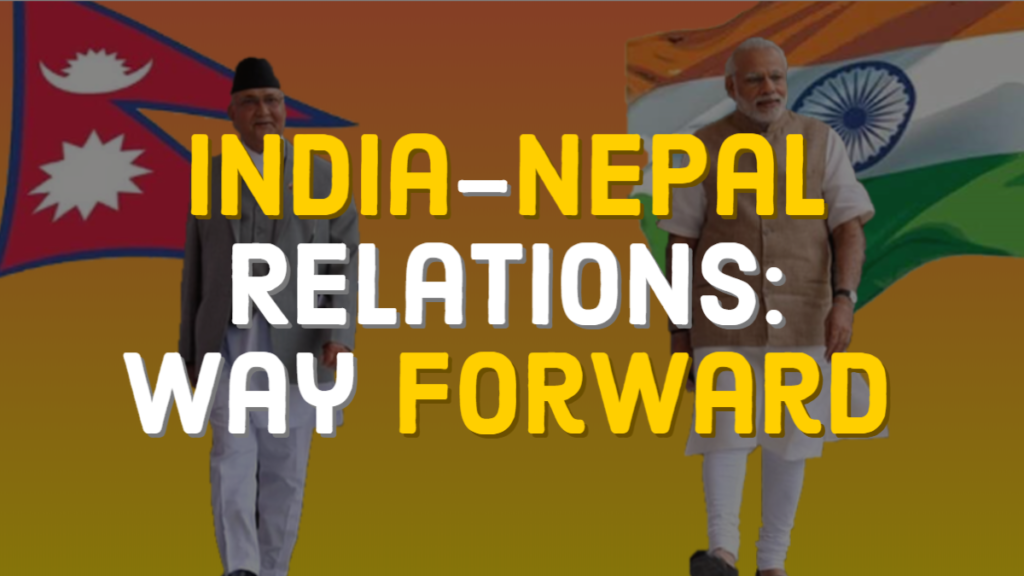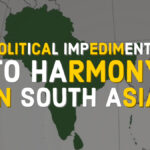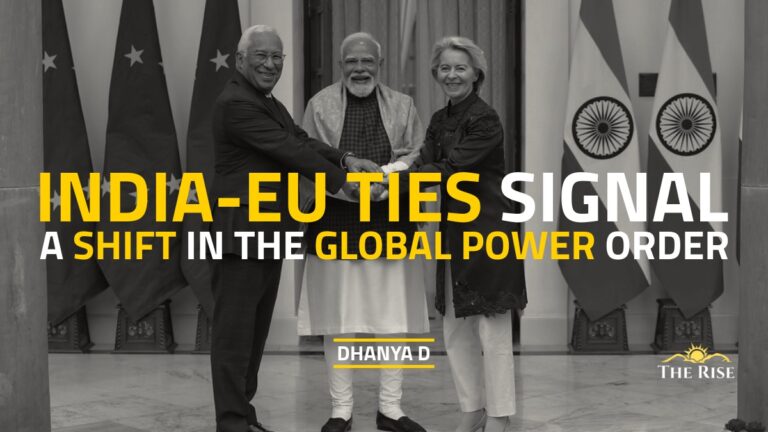India and Nepal have a profound relationship, but the relationship is characterized by ebb and flow. In recent times, this bond has felt shocks in the form of border disputes and both the states cannot afford this shock to continue long. Thus, a way forward for a better future and a strong relationship can be realized through a high-level political dialogue and by the creation of the environment conducive for it.
India and Nepal share a “unique” relationship. India and Nepal are destined by the geography to be close to each other and are marked by socio-cultural, economical, and religious similarities. Moreover, an open border between the two states has strengthened the relationship.
Our relations with Nepal are as old as the Himalayas and the Ganga.
Narendra Modi
Though India and Nepal share a deep-rooted and historical friendship bond, there have always been highs and lows in the relations. Recently, this strong linkage turned sour because of the border disputes between the two states. The dispute is in the area of Lipulekh, Limpiyadhura, and Kalapani, which both sides claim to be theirs. Both India and Nepal refer to the Sugauli Treaty but have different perceptions about the origin of the Kali River.
Besides, the ‘wolf-warrior’ media have played a significant role in fuelling the dispute. Nepal, in response to the border dispute, released a new map and amended the constitution of Nepal as well. Similarly, Prime Minister KP Sharma Oli accused India to be against his government, and very latest “Ram-Ayodhya” debates have undoubtedly increased the bitterness, and in a deep sense has deterred the people-to-people sentimentalities more than a political relationship of both the states. For sure this has increased negative sentimentalities in both the states towards each other.
Way forward for a better future –
Peace cannot be kept by force. It can be only achieved by understanding.
Albert Einstein
First of all, further escalation, either militarily or in terms of words, should be ceased immediately to make an environment conducive for the diplomatic talks. The blame game by India and Nepal against each other should be stopped. Both the states’ leaders should create a diplomatic and political environment suitable enough for the dialogues. If possible, an all-party national consensus is what a settling of disputes and a long-lasting friendship requires. For this, the media has a significant role to play. Instead of disseminating false news about both the states, facts and truths should be reported for easing the tensions between the people of both states and garner positive nationalism.
Instead of disseminating false news about both the states, facts and truths should be reported for easing the tensions between the people of both states and garner positive nationalism.
The border disputes between India and Nepal should be resolved bilaterally in a diplomatic manner. A Foreign Secretary Level meeting has been proposed between the states to resolve the boundary dispute. But, as the sensitivities of the disputes continue to increase, a high-level political dialogue between the two states is the best possible measure to settle the dispute permanently. A Foreign Minister Level meeting or, if possible, a meeting at the highest executive level would be suitable not only to resolve the border disputes but also to resolve all the dissatisfaction in the relationship.
Must Read: Beginning of a new Cold War
Both states are aware that diplomatic negotiations are the only way forward. Nepal is also familiar to use the “give and take” method to resolve claims and counterclaims in the territory as it has been practised while resolving border dispute with northern neighbour-China in the 1960s.
Furthermore, India should leave its traditional security angle towards Nepal and be proactive with innovative strategies and policies. Instead of viewing Nepal from the “Chinese lens“, concentrating more on the bilateral resolution of the conflict would help both the nations.
Since the dispute of Lipulekh, Limpiyadhura and Kalapani concerns China as well, trilateral discussions can be proposed. After resolving the dispute, a trilateral trade cum pilgrimage route can be devised so that both India and Nepal could benefit from the trade with China through this route.
Further, Nepal should also focus on resolving the intra-party conflict within the Nepal Communist Party (NCP) which seems to be related to the Nepal-India dispute. Thus, Nepal should focus on a strong national and all-party opinion regarding Nepal-India relations.
Way forward for Nepal and India is through a high-level diplomatic talk and creating an environment conducive for the dialogue.
Additionally, many experts have added several ways for resolving border disputes and strong India-Nepal relations such as a multilateral way through the United Nations (UN), and the International Court of Justice (ICJ). Also, ideas of creating international opinions and narratives about the disputes have emerged, but the only way forward for Nepal and India is through a high-level diplomatic talk, and creating an environment conducive for the dialogue is best for both the neighbouring states.
Thus, the leadership of both states should focus on a mutually beneficial strong relationship to ensure a peaceful and prosperous South Asia. A quick arrangement of such dialogue should be worked upon immediately by both the states so that a clear message of friendly relationship goes to the people and the international community as a whole.
Disclaimer: The views expressed in this article are of the author solely. TheRise.co.in neither endorses nor is responsible for them.
About the author
The author holds a Master's degree in International Relations and Diplomacy from Tribhuvan University, Nepal. He is a Daayitwa Public Policy Fellow 2020 placed at National Planning Commission, Nepal.









